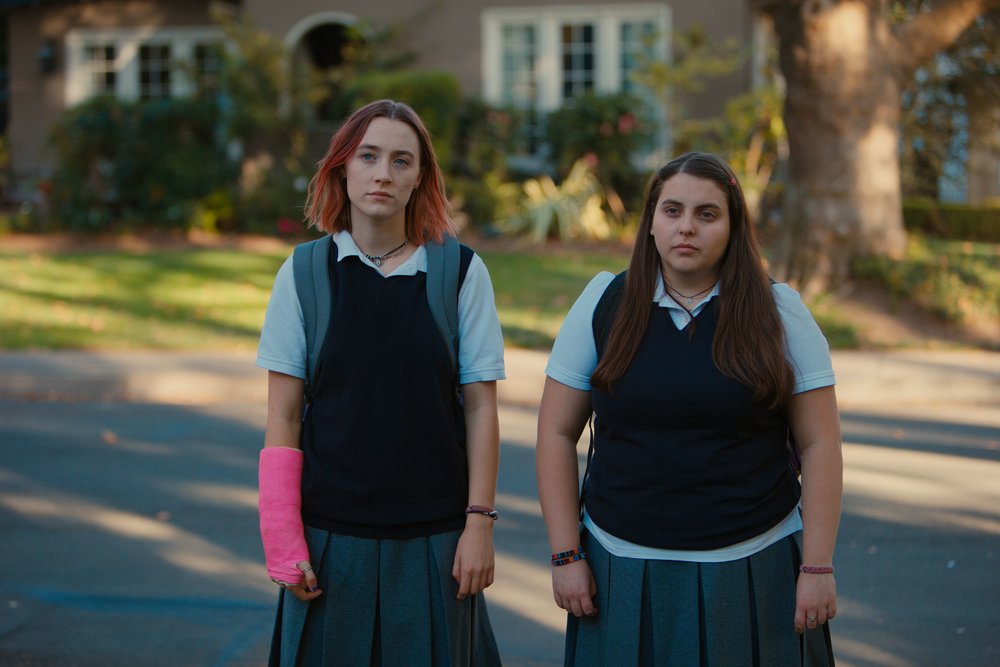
Friday Flicks | Lady Bird | movie reviews
The high school coming-of-age comedy, when pitched somewhere between slapstick and sincere, may just be the perfect cinematic genre.
For therein lies the somewhat shameful but persistently heart-fluttering promise that any cinephile feels when the lights go down and the movie screen brightens: an exuberant, greedy, uncynical yearning for self-discovery. Limitless possibilities that run roughshod across the boundaries of a naïve, limited understanding of the world.
Rushmore. Dazed & Confused. Ghost World.
Youth is the subject of these movies, and, lucky enough for even the most jaded of film fans, youth is not just about being young.
Greta Gerwig’s Lady Bird opens with a quotation from Joan Didion, that great neurotic chronicler of the sad, weird banality of California:
“Anybody who talks about California hedonism has never spent a Christmas in Sacramento.”
Wry, disappointed, carefully attuned to that which she finds distastefully mundane but simply can’t look away from.
The line could come straight from the mouth of Catherine “Lady Bird” McPherson (Saoirse Ronan), a 17-year-old senior at a Catholic high school in Sacramento, California in the academic year of 2002-2003.
Why does she call herself “Lady Bird”? Well, why not.
The name is strange and eccentric, in an environment that encourages obedience and conformity. It is independent and self-determined, as opposed to handed down from on high by her parents, teachers or God. And it is bizarre and body dysmorphic, a girl-turned-adult-turned-not-quite-human.
Over the course of the movie, Gerwig follows Lady Bird through pretty familiar teenage rites of passage: trying out for the school play, testing the loyalty of old friends and the allure of new ones, her first time smoking weed, her first time having sex, never quite studying but eagerly applying to colleges thousands of miles from home, without the grades or the money to justify such ambition.
The narrative is both diffuse and directional: Lady Bird is floating between identities, trying on different semblances of a self she longs to take control of, all the while pointed towards the daunting reality of life after graduation, when she is determined to achieve the fixed, sophisticated maturity of an East Coast young adult.
But Lady Bird is not a movie about the self that one discovers while wandering in the wilderness miles from home. It is about the self that one stumbles upon while looking for a drink in the desert of one’s own backyard.
Much like Kogonada’s high modernist, small town indie Columbus from earlier this year, Lady Bird’s explicit thesis is that paying attention and love rhyme, and may even be synonyms.
 LADY BIRD (2017)
LADY BIRD (2017)
Lady Bird longs to leave home. She longs to shake herself free from her exasperated mother (Laurie Metcalf), her sad sack father (Tracy Letts), her chipper but somewhat pathetic childhood best friend (Beanie Feldstein), and from Sacramento itself, which she finds maddeningly, irredeemably uninspiring.
But Gerwig, an actress of charming guilelessness who is making her directorial debut, and Ronan, one of the most gifted young actresses working today, fill the movie with carefully observed details about this young woman’s family, friends and city that the audience cannot fail to be affected by, even if Lady Bird occasionally speeds them by.
All too often, these details come in the form of tears. During a mother-daughter road trip that is set to the soundtrack of The Grapes of Wrath, the audio book. During a desperate embrace from a recently outed boyfriend who wants just a little more time before telling his parents about his sexuality. During high school theater practice, when a teacher’s well of sorrow unexpectedly turns an acting exercise into silent therapy.
Gerwig’s penchant for the faster-than-a-blink joyfulness that comes with unassuming jump cuts, an editing style exemplified by Truffaut, Godard, and other French New Wave lovers of disorienting, youthful vitality, allows Lady Bird to accumulate the emotional impact of these details even as she hops from one to the next.
But these details do not go away, and Gerwig assures us throughout that they have not gone unnoticed. By the end of the movie, Lady Bird has come to realize that Sacramento hedonism may indeed be an oxymoron, but that in no way devalues the depth of joy, grief, misunderstanding and deep connection that she feels to her home town and that her family and friends feel towards her.
There is something somber, beautiful and heartbreakingly satisfying about succeeding in one’s pursuit to understand oneself just a little bit better.
Click on the audio player below to hear a review of Lady Bird on a recent episode of WNHH's "Deep Focus" radio show.

